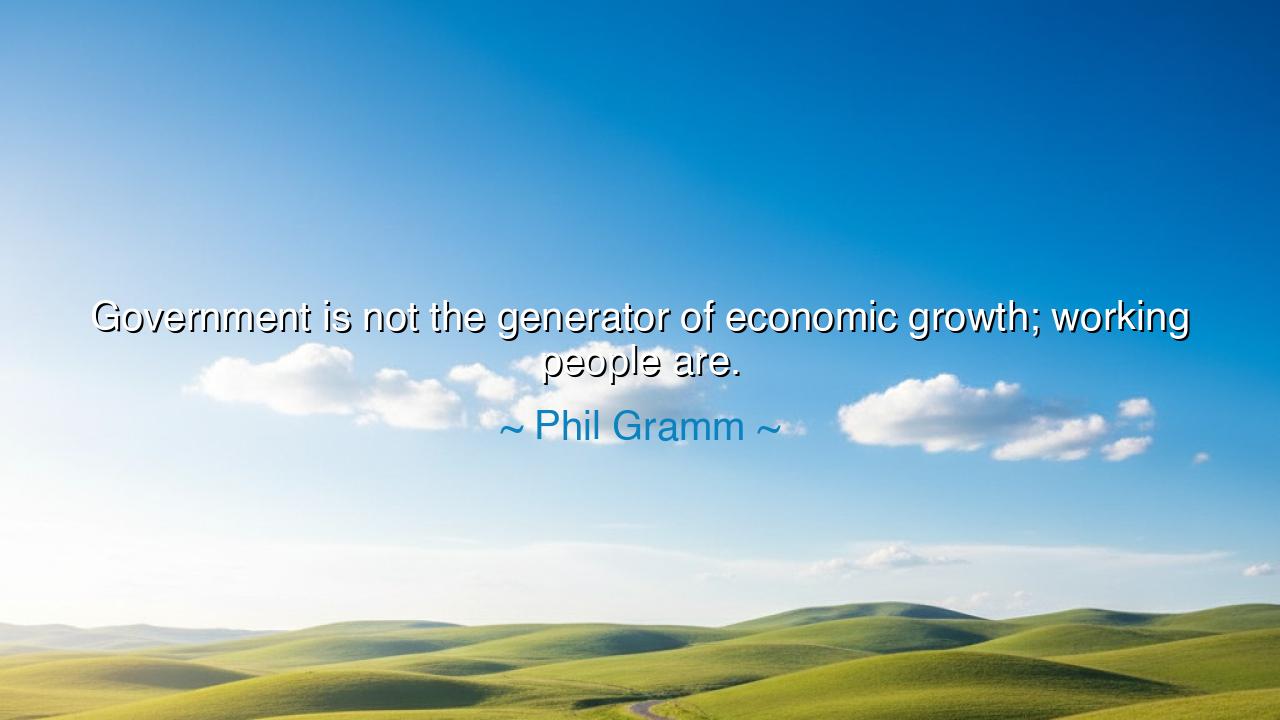
Government is not the generator of economic growth; working






"Government is not the generator of economic growth; working people are." — Phil Gramm
Hear these words, O children of labor and time, and mark their truth: Phil Gramm, a man of economics and governance, spoke not as a cynic, but as one who had seen the engine of nations at work. His statement burns with clarity — that government may guide, may guard, may even nourish the soil of prosperity, but it is the working people who sow, who sweat, who build the world. The wealth of nations does not flow from marble halls or gilded offices; it flows from calloused hands, weary brows, and hearts that rise each morning to labor. Governments may write policies, but men and women write progress.
The meaning of this truth reaches deep into the marrow of civilization. Every empire that has risen — from Rome to Britain to America — has done so upon the shoulders of its people, not its rulers. The government can craft laws to encourage commerce, yet it cannot hammer the steel, plant the seed, or craft the song that drives the soul to create. It may distribute wealth, but it cannot produce it. The true source of economic growth is the creativity, diligence, and faith of those who work — those who make something where there was once nothing. The hands that turn the wheel of industry, the minds that dream of invention, the courage that risks failure — these are the true architects of prosperity.
Consider the story of America’s Great Depression. In the darkest years, when banks had failed and markets crumbled, it was not decrees from Washington that brought life back to the streets. It was the people — the farmers who replanted their barren fields, the small business owners who reopened their shops, the builders who found ways to rebuild with little more than hope and grit. Government programs gave support, yes — but it was the working people, through their resilience and innovation, who rekindled the flame of growth. A government can open a door, but it is the worker who must walk through it.
Even in lands far older than America, this truth has echoed through the ages. In the great city-states of ancient Greece, the strength of the polis came not from its senators, but from the craftsmen who shaped marble and the sailors who carried goods across the sea. In the vast empire of China, it was not the emperor’s decree that brought wealth, but the toil of farmers carving rice terraces into mountainsides. And in every age since, those who governed wisely understood this: that prosperity is born from the people, and that rulers must serve, not smother, the spirit of labor.
Phil Gramm’s words, though forged in the fires of modern politics, carry this same eternal wisdom. They are a warning against the temptation of overreach — against the belief that prosperity can be commanded by law or conjured by policy alone. The government, like the captain of a great ship, must steer, but it cannot row. Its duty is to create conditions where working people may thrive — where enterprise is rewarded, where innovation is encouraged, where effort is honored. When government forgets this, when it takes too much from those who create, it risks choking the very engine it seeks to drive.
Let us also remember the dignity of work. For too long, the world has measured worth by title or wealth, forgetting that every baker, every teacher, every craftsman contributes to the lifeblood of the nation. It is the builder who raises the skyline, the farmer who feeds the city, the nurse who heals the sick — these are the silent forces of growth. To honor them is to honor the truth of Gramm’s words: that economic strength is not born in government chambers, but in the hearts of ordinary men and women doing extraordinary things each day.
The lesson is clear and timeless: never look to government as the source of prosperity, but as its steward. Let the state protect fairness and opportunity — but let the people build the future. Work with pride. Create with courage. Do not wait for permission to act or for leaders to bless your ambition. Each person who labors honestly contributes a spark to the great fire of human progress. And when all those sparks join, they illuminate the path of a nation. For in the end, the true power of growth lies not in the crown or the council, but in the strength of the people — in you, and in me, and in all who choose to work rather than wait.






AAdministratorAdministrator
Welcome, honored guests. Please leave a comment, we will respond soon